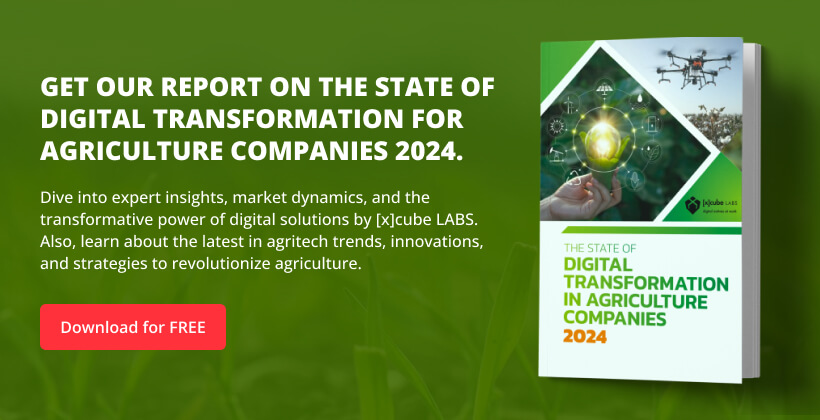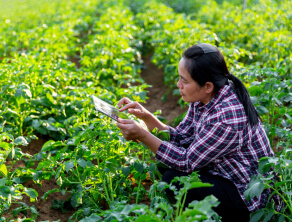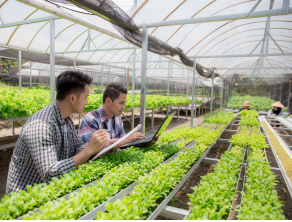Revolutionizing Agriculture: Cutting-Edge Solutions for Agri Input Challenges
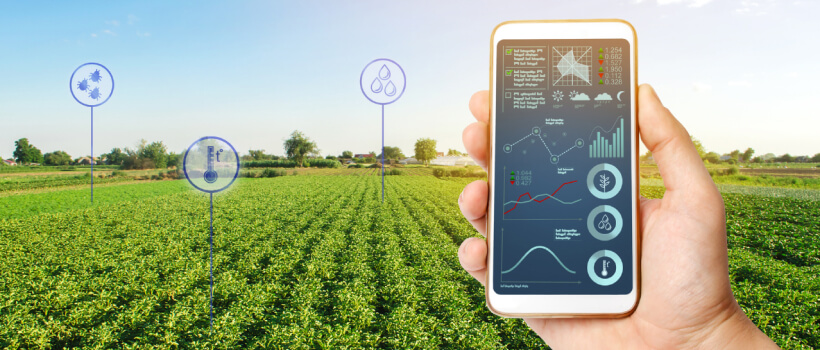
Introduction
Agri input companies are the backbone of the agriculture sector. They provide the essential means for farmers to plant crops and are the starting point of the agricultural value chain. These companies are involved in the research and development of new seed products, manufacturing them, selling them to farmers, and assisting in overcoming cropping issues.
Typically, these companies sell their products to retailers, who then sell these products to farmers. Once the retailer sells the products, the agri input company usually does not receive any feedback from the farmers. This lack of communication poses multiple challenges for agri input companies.

Challenges Faced by Agri Input Companies
Manual Data Collection
- Remote Locations of Farmers: Farmers often live in remote areas, making data collection challenging.
- Lack of Access to Communication Means: Limited access to alternative communication methods hampers effective data collection.
- Inaccurate Readings: Manual data collection can lead to inaccuracies.
Lack of Farmer Loyalty
The competition among agri input companies is intense, with each company introducing new innovative products. This abundance of options makes it difficult for farmers to remain loyal to a single company. Despite numerous loyalty schemes and programs, maintaining farmer loyalty remains a challenge.
Lack of Real-Time Data
There is a lack of real-time data to understand the impacts of climate change, pest control, and soil fertility on crop growth and productivity.
Also read: Understanding Agritech: The Future of Agriculture Technology.
Lack of Transparency Across the Value Chain
There is limited visibility of the passage of goods across the value chain, making it difficult for agri input companies to know if there are any hindrances in their products reaching the desired customers.
Challenges Faced by Farmers Involving Agri Input Companies
Farmer Complaints Do Not Reach Agri Input Companies
Farmers often encounter problems with agricultural inputs like seeds, fertilizers, or pesticides, but their complaints usually don’t reach agri input companies due to poor communication channels. Without a structured feedback mechanism, farmers’ grievances remain unaddressed, leading to frustration. Additionally, limited awareness and barriers, such as language issues, further hinder effective communication.
Farmers Do Not Receive Timely Inputs Based on Demand
Farmers often face delays in receiving agricultural inputs due to inefficiencies in the supply chain, including logistical challenges and poor inventory management. Additionally, they may lack access to timely market information, making it difficult to anticipate input requirements. Financial constraints, such as limited access to credit or fluctuating prices, further delay obtaining necessary inputs.
Farmers Do Not Meet Agri Input Dealers at the Right Time for the Right Recommendation
Farmers often miss out on timely recommendations from agri input companies due to various factors. Limited access to dealers in rural areas hampers farmers’ ability to seek advice when needed. During peak seasons, dealers may be overwhelmed, further limiting personalized assistance. Additionally, inadequate training and awareness prevent farmers from understanding their input requirements, leading to suboptimal choices.
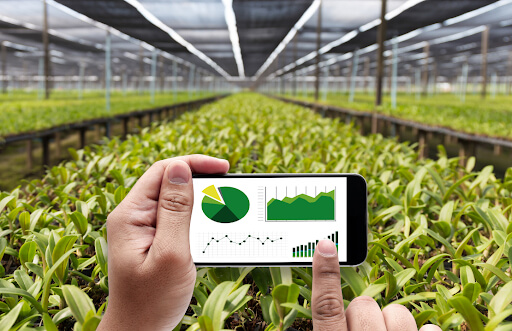
Solutions Across the Agri Value Chain
Plot Digitization (R&D)
Implementing digital tools for R&D involves digitizing agricultural plots to enhance data collection and analysis efficiency. This can be achieved through satellite imagery, drones, or GPS technology to accurately map and monitor field conditions. Using the data collected from these tools, agri input companies can make informed decisions on the types of seeds to manufacture.
Warehouse Traceability
Warehouse traceability solutions aim to enhance transparency and efficiency throughout the agricultural supply chain. By introducing barcode tagging systems, agricultural products can be tracked from the warehouse to the consumer, ensuring accountability and traceability at every stage. This ensures that the company knows the manufactured agri inputs are passing seamlessly through the various stakeholders involved in the supply chain.
Sales
Implementing Customer Relationship Management (CRM) in sales streamlines various aspects of operations, including order and dealer management, enabling efficient tracking and management of farmer orders throughout the sales process. Monitoring demo plot performance provides valuable insights for product demonstration and promotion strategies. Integrating these features into CRM solutions optimizes retail and sales operations, ultimately improving farmer service and business efficiency.
Farmers – Advisory Application
For farmers, an advisory application offers comprehensive support across various aspects of agriculture. It includes real-time weather advisories delivered through mobile apps or web platforms, incorporating historical data and predictive analytics for accurate forecasts and risk mitigation. Crop information databases provide insights into cultivation practices, pest management, and market trends, accessible through mobile apps or online portals to enhance crop management and optimize yields.
Geo-tagging technology enables precise mapping and monitoring of agricultural plots, aiding in efficient resource management. Area audits assess land use patterns and soil health. At the same time, yield estimation employs remote sensing techniques like satellite imagery or drones alongside predictive models to forecast crop yields accurately and aid decision-making. Overall, these features empower farmers with data-driven insights and tools to enhance productivity and resilience in producing crops.
Also Read: Agritech: Technologies Driving Global Agriculture.
How [x]cube LABS Helped Major Agri Input Companies Overcome Problems with Strategic Digital Solutions?
Case Study 1
For a global agritech giant, we built a digital scanning system that offers growers high-resolution maps and delivers up to 27 layers of soil information via its platform. Utilizing passive gamma-ray detection technology, it provides detailed mapping of nutrient properties, pH, soil texture, organic matter, carbon, and more, regardless of soil moisture, compaction, or crop cover.
Case Study 2
AI/ML Collaboration: We partnered with a multinational company to revolutionize crop protection solutions through artificial intelligence and deep learning. By leveraging AI-driven innovation, we accelerated the development of sustainable products that safeguard crops from diseases, pests, and weeds while preserving ecosystems.
Also Read: Harnessing Generative AI in Agriculture: A Game-changer for Agri-tech Growth.
Case Study 3
Field View Platform: We developed an integrated digital solution that facilitates agricultural data collection, storage, and analysis in a user-friendly interface. Supported by dedicated customer service, data-driven insights, and advanced scientific capabilities, FieldView™ empowers users to manage and optimize their farming operations efficiently.
Case Study 4
We built a global service that engages with various stakeholders in the food industry to address challenges and ensure freedom to trade. It provides a network of trained experts and tools to assist farmers and food system stakeholders in decision-making, thereby expanding market opportunities. Benefits include increased profitability for farmers through market expansion, assistance in meeting market restrictions, ensuring food processors’ competitiveness through a reliable supply chain, and supporting food retailers in meeting consumer demand for healthier, high-quality produce.

Conclusion
The trend among major agri input players is leaning towards developing interactive applications for farmers and resolving supply chain issues through technology. The recent surge in implementing AI indicates its transformative potential when utilized effectively. However, the slow adoption of AI, IoT, and agritech by some players is causing disruptions in the agricultural value chain.
- Most seed companies have not yet deployed AI, IoT, and automation.
- On average, only 14% of crop protection companies have widely adopted AI, IoT, and automation.
- On average, 40% of food processing companies have not yet deployed AI, IoT, and automation.
From these figures, it is clear that the quick adoption of AI in agriculture will be beneficial for agri companies to implement AI and other tools in their technology solutions.
How can [x]cube LABS Help?
[x]cube LABS’s teams of product owners and experts have worked with global brands such as Panini, Mann+Hummel, tradeMONSTER, and others to deliver over 950 successful digital products, resulting in the creation of new digital revenue lines and entirely new businesses. With over 30 global product design and development awards, [x]cube LABS has established itself among global enterprises’ top digital transformation partners.
Why work with [x]cube LABS?
- Founder-led engineering teams:
Our co-founders and tech architects are deeply involved in projects and are unafraid to get their hands dirty.
- Deep technical leadership:
Our tech leaders have spent decades solving complex technical problems. Having them on your project is like instantly plugging into thousands of person-hours of real-life experience.
- Stringent induction and training:
We are obsessed with crafting top-quality products. We hire only the best hands-on talent. We train them like Navy Seals to meet our standards of software craftsmanship.
- Next-gen processes and tools:
Eye on the puck. We constantly research and stay up-to-speed with the best technology has to offer.
- DevOps excellence:
Our CI/CD tools ensure strict quality checks to ensure the code in your project is top-notch.
Contact us to discuss your digital innovation plans, and our experts would be happy to schedule a free consultation.
![Blog-[x]cube LABS](https://d6fiz9tmzg8gn.cloudfront.net/wp-content/uploads/2016/06/blog_banner.jpg)
